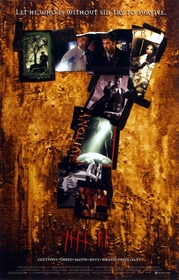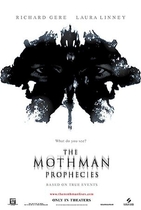Our editor-in-chief Nate Yapp is proud to have contributed to the new book Hidden Horror: A Celebration of 101 Underrated and Overlooked Fright Flicks, edited by Aaron Christensen. Another contributors include Anthony Timpone, B.J. Colangelo, Dave Alexander, Classic-Horror.com's own Robert C. Ring and John W. Bowen. Pick up a copy today from Amazon.com!
Se7en (1995)
One of a handful of films that is based on the religious concept of "seven deadly sins," director David Fincher's Seven (or Se7en as the sillier title has it) is an uneven work that contains many excellent elements yet unfortunately drags on as if trying to demonstrate the sin of sloth in a few stretches.
Morgan Freeman is Detective William Somerset, about to retire in seven days (here scripter Andrew Kevin Walker throws out a red herring for the title). Brad Pitt is David Mills, his brash replacement. Somerset and Mills end up at a crime scene where an obese man was apparently murdered at his kitchen table while eating a bowl of spaghetti. Other murders they're sent on in close succession soon show a link -- the seven deadly sins. Seven concerns the murders and Somerset and Mills' attempts to figure out who is behind them and bring the perpetrator to justice.
It's a plot that could fuel a mundane detective television show or a stylistic film. Seven fits the latter description for the most part. There are some wild implausibilities in the script, but other aspects of the film enable you to easily bypass most of them, and the wonderfully wry ending makes up for any silliness that Walker might try to slip by.
One of its strongest aspects is the visual. There are many unusual cinematographic techniques, such as the opening credit sequence, which has been influential for many subsequent films. Another outstanding, and extended shot occurs towards the end while Spacey gives what amounts to a monologue while framed in an unusual way. Even more outstanding is the production, art and set design by Arthur Max, Gary Wissner and Clay A. Griffith, which focuses on the seedy, unpleasant side of Seven's anonymous downtown setting. The sets for some of the murder victims' homes, as well as Mills' apartment are incredibly bleak and disturbing -- the murder victims' home are mostly over the top grungy--just as they should have been. Mills' apartment is much more subtly disturbing. Like an equally noirish, daylit Blade Runner, Seven also takes place in a city where it almost constantly rains. Fincher was obviously going for an oppressive, depressing atmosphere, and he created exactly that. The murder scenes are also appropriately disturbing and occasionally a bit gory (non-horror fans may have to glance away from the screen for a second or two -- as you should have to if Seven is to be realistic).
Where Seven fails a bit is in its pacing. Some scenes take twice as long as they should and verge on being boring. As quickly as other parts of the film move -- including the implausibility of the film's events occuring in a seven day span -- the slowness of scenes such as the exploration of the suspect's apartment crushes the film's momentum temporarily. I suppose one could argue that the pacing disruptions were meant to create the same emotions as the oppressive visuals, but where the latter has a melancholy beauty that pulls you further into the film's world, the former has the opposite effect -- making you glance at your watch or your video-machine's display instead.
Seven has the benefit of an excellent cast -- Freeman, Pitt, Gwyneth Paltrow, Kevin Spacey, etc. They all deserve the many kudos they've received over the years, and have all been in many films I've enjoyed greatly. Here, Spacey, as John Doe, is the real standout, giving a complex performance that shows you all the shades of his character as he masterfully creates the mixed feelings towards Doe that are realistically demanded. Paltrow is also great, although her screen time is more limited and her character performs a couple questionable actions given Seven's time frame. Freeman and Pitt, the leads, are both good, but this is certainly not their best performances. They both play their characters with quirks that may leave you scratching your head more than anything else. In Freeman's case it's understatement to the point that you want to occasionally poke him to see if he's awake, and in Pitt's case, he plays his character as unlikeable as Early Grayce by the mid-point of Kalifornia. Neither performance can be called misconceived, exactly (although Pitt's seems a bit over-calculated to make the ending of the film work), but they do pose more questions than they answer. Maybe that's what Fincher was going for, but I subtracted another point for this.
While it's not the gem of the 90's that some fans portray it as, Seven is certainly an entertaining film that should at least give fans of horror, detective and serial killer films an enjoyable two hours. It might be too brutal and depressing for those who only like Julia Roberts movies, but then again, they probably haven't read this far.








